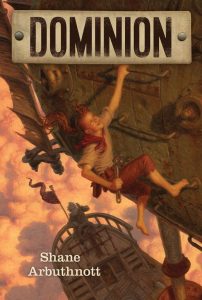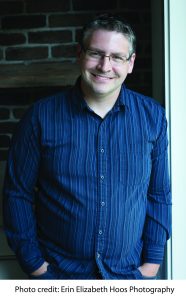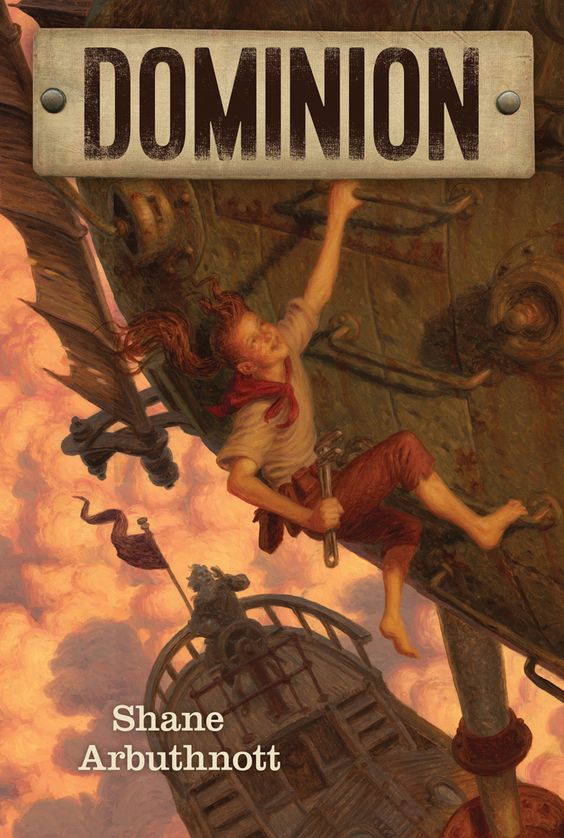The following post is written by Shane Arbuthnott, author of Dominion.
“Where did you get the idea for your book?”
This seems to be a common question for authors. My debut novel, Dominion, only came out at the end of February, but I’ve already heard it a dozen times. I usually rattle off something about themes and worldbuilding. But my answer is always incomplete, because a book takes more than one idea. So I thought maybe I might try to answer that question properly here. This might take a while.
For most of my stories I can’t pinpoint the idea that started it all, but I actually can for Dominion. I was working on a story in which magic was fading from the world as science and technology rose in prominence—not exactly a new idea, I know. I wondered, “What if magic wasn’t replaced? What if it was a recent scientific discovery?” The new idea was shiny, and I chased it. I started sketching out a world where, during the Industrial Revolution, a British scientist discovered magic. That was the start of Dominion. But it wasn’t Dominion yet.
 From there it took a while to settle on the form the magic might take. At first it was just like energy, but that seemed too dry and simple. So I tried injecting a little animism—the idea that everything in the world has a soul, a consciousness. But that seemed too free-wheeling. I sorted the magical spirits into the classical four elements, and that felt right. It was becoming more Dominion-esque, but it still wasn’t there.
From there it took a while to settle on the form the magic might take. At first it was just like energy, but that seemed too dry and simple. So I tried injecting a little animism—the idea that everything in the world has a soul, a consciousness. But that seemed too free-wheeling. I sorted the magical spirits into the classical four elements, and that felt right. It was becoming more Dominion-esque, but it still wasn’t there.
After that, I found some of my suspicious tendencies creeping in. I’m always looking for the hidden cost of things. If magic is real, who gets access? And who pays the cost? The more I explored my original idea, the darker it seemed. I didn’t think the discovery of magic would solve the world’s problems, but rather compound them: the poor would still be poor, but now the rich could actually live in castles in the sky. And the non-human magical spirits would be very easy to dehumanize, wouldn’t they? So now I had the central problems of the novel. And that’s when Molly stepped in.
If I had to name “the idea,” just one idea that made this book, it would be her. She walked onto the page and carried the story where it needed to go. In the first version of the book, I actually had two protagonists: Molly and Haviland Stout, the scientist who “discovered” the spirits. I patterned Haviland’s chapters after the Allan Quatermain stories by H. Rider Haggard—Victorian adventure stories with more derring-do than scientific inquiry. But I realized quickly that this was Molly’s story, not Haviland’s. I cut his chapters, refocused on her, and saw what she could do. And that’s how we got to Dominion.
These are just the biggest ideas, and only the ones I can remember. It’s all still a bit mysterious to me, the way a book comes together. But it’s never just one idea. Sometimes even the big ideas, the ones that started it all, have to be thrown out along the way.
Actually, after writing this, I think I’ve come up with a simple answer to that first question. But it’s not very exciting, and doesn’t make for good interview fodder. Where did I get the idea for my book? From thinking. A lot of time, and a lot of thinking.
Dominion is available now!

Shane Arbuthnott grew up in Saskatoon, Saskatchewan, and now lives in Guelph, Ontario, with his family. When he is not writing, he can be seen chasing his three adventurous children, trying to convince them to occasionally eat green things. His short fiction has previously appeared in On Spec and Open Spaces. For more information, visit www.shanearbuthnott.com.

